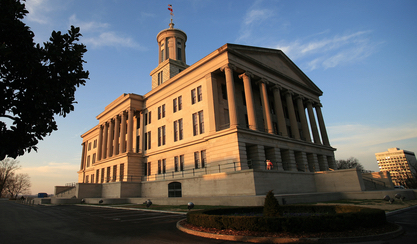(NASHVILLE, Tenn.)– The NCAA College Basketball Tournament is just around the corner. Representative Bryan Terry (R-Murfreesboro) has filed House Bill 1033, which has been dubbed the “March Madness and Fantasy Football Freedom Act” and is aimed at decriminalizing the yearly tradition of thousands of Tennesseans participating in low-level sports entertainment office pools.
The bill would allow an individual participant to place a maximum of $25 into a low-level sports entertainment pool that is run solely by an individual, but not as a business for profit. The maximum pool size is $1,000. Most March Madness pools involve participants filling out one or two brackets of 63 games with an entry fee of five or ten dollars per bracket. Fantasy football often involves either a flat entry fee or an entry fee of around ten dollars with one dollar added per roster transaction. The bill is limited in its scope to only low-level sports entertainment pools.
“Whether for camaraderie or for a sense of entertainment, thousands of Tennesseans participate in these entertainment pools at work or with their friends. They put five or ten bucks in a pot and fill out a bracket or draft a team,” explained Terry. “The activity is more about entertainment and not gambling. Let’s be honest, one or two movie tickets often cost more than an entry into a pool, and you gamble more on whether or not the movie is actually going to be entertaining.”
Former NBA player and U.S. Senator Bill Bradley passed the Professional and Amateur Sports Protection Act (PASPA) in 1992 which limited any form of gambling on sports, including low level office pools, to only four states: Nevada, Delaware, Oregon, and New Jersey. As such, the State of Tennessee has kept statutes on the books prohibiting activities such as March Madness and Fantasy Football pools.
The legislation was filed in light of the decision reached last May by the U.S. Supreme Court in Murphy v NCAA — a case which overturned PASPA. By dissolving the legal bounds set by PASPA, the Supreme Court extended the right to participate in low-level pools to all 50 states.
“Ideally, it would be a simple fix to just repeal current statutes, but that would open the door to widespread sports gambling. I’m not going down that road. I’m just focused on ensuring office workers and friends can enjoy activities that they have always done without risk of criminalization,” said Terry.
In 2018, it is estimated that over 70 million March Madness tournament brackets were completed nationwide with upwards of $10 billion in various pools. Likewise, the Fantasy Sports Trade Association estimates that 33 million people participate in fantasy football, with more than $1.18 billion changing hands through pools each year. Despite their widespread popularity and recent federal “green light”, these low level sports entertainment pools, in any capacity, are still considered illegal in Tennessee as a Class C Misdemeanor. Technically, one could be charged, convicted, and sentenced to 30 days of jail time and ordered to pay a $50 fine for participating in fantasy football or March Madness pools. If two people were to promote the creation of an office pool, they could be charged with Aggravated Gambling Promotion, which is a Class E Felony carrying anywhere between one to six years in prison and a fine up to $3,000.
“The General Assembly used to utilize the Office of the Repealer to remove anachronistic or unnecessary laws from our code. We need to go that route with March Madness misdemeanors and Fantasy Football felonies,” exclaimed Terry. “This statute, to my knowledge, has never been enforced and needs to be repealed.”
If the Tennessee General Assembly passes House Bill 1033, it will be joining 27 other states that are looking to address this issue in some capacity. Though Terry is taking a unique approach for thousands of Tennesseans who annually participate in low-level sports entertainment pools, he hopes he can provide security for all those who fill out brackets.
“Due to PASPA, the Feds basically created a system of black market bracketology, and it’s time that this statute goes bust like most brackets,” concluded Terry.
For more information regarding this bill please contact the office of Representative Bryan Terry at the information below.
Office: (615) 741-2180

